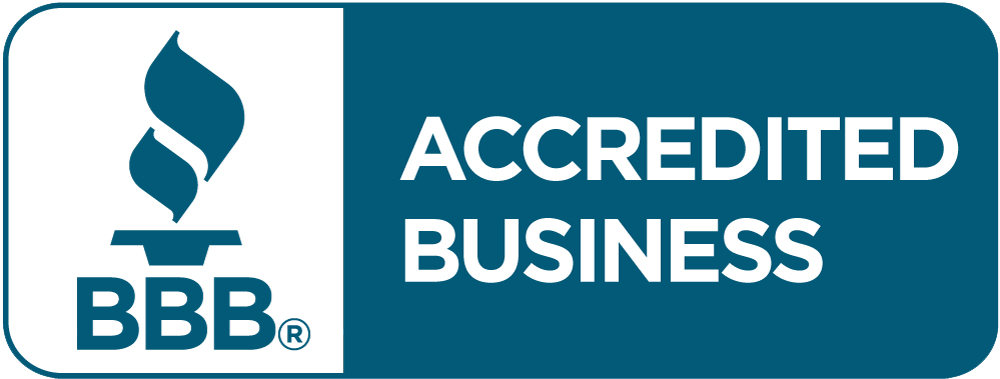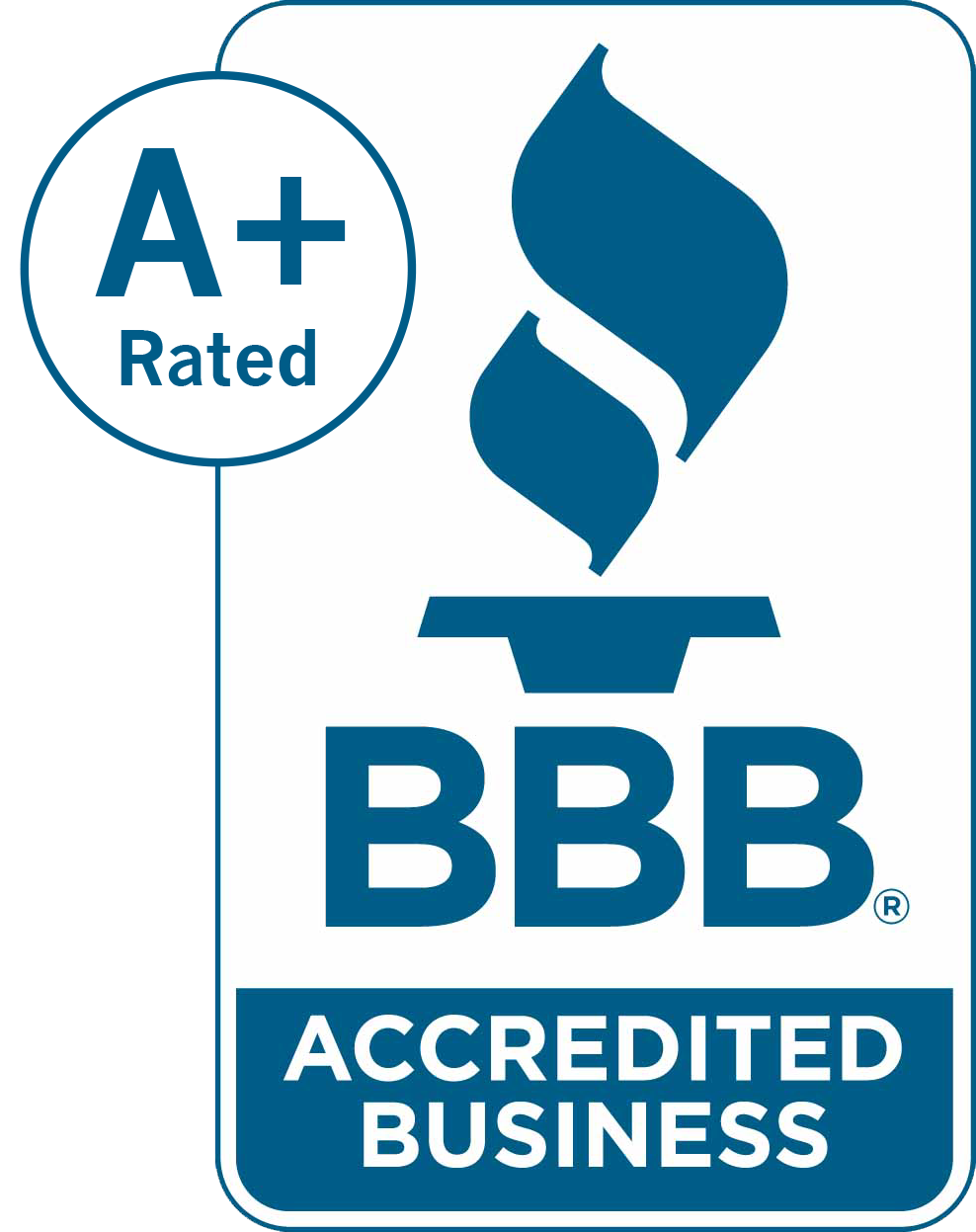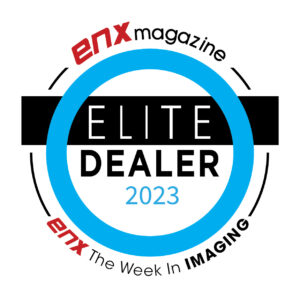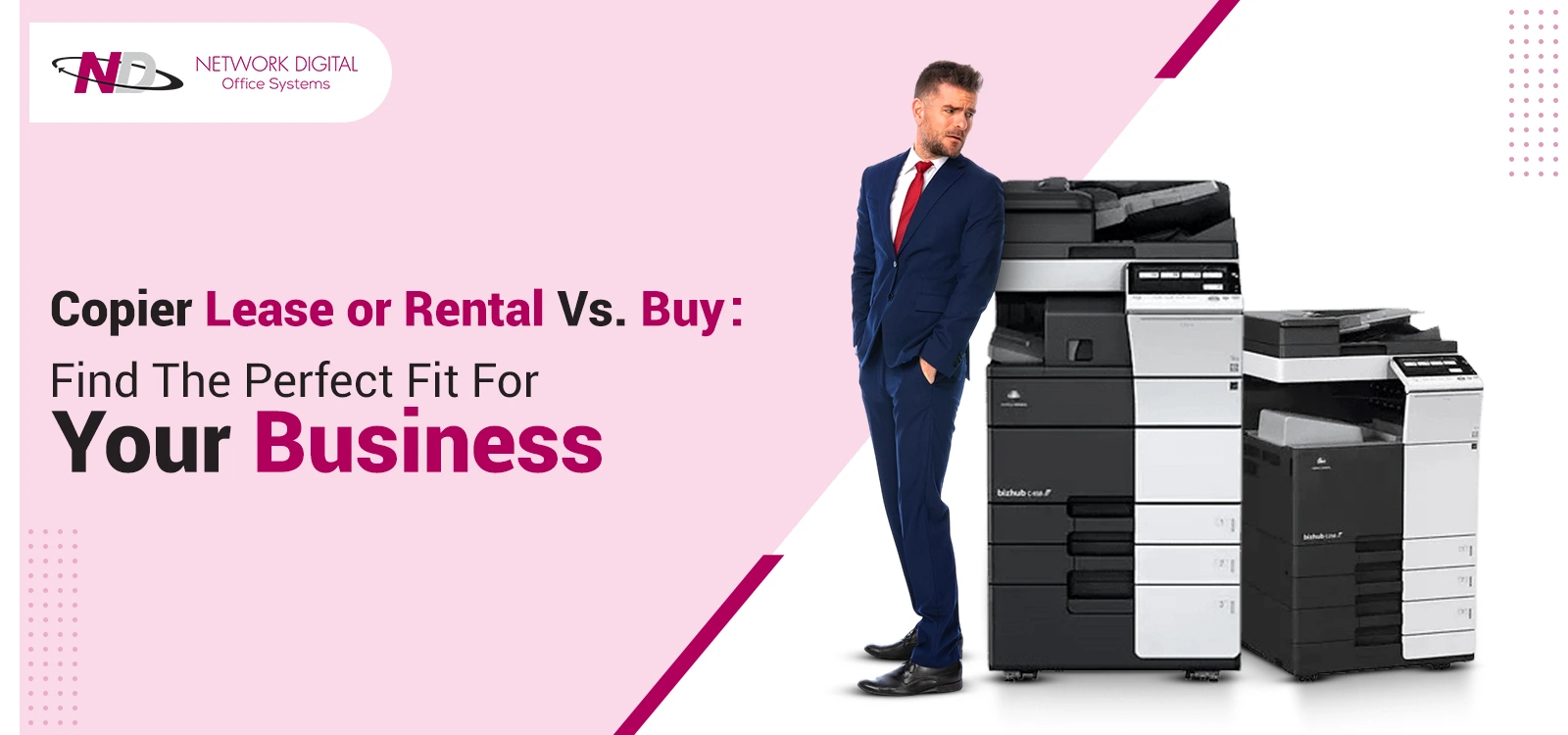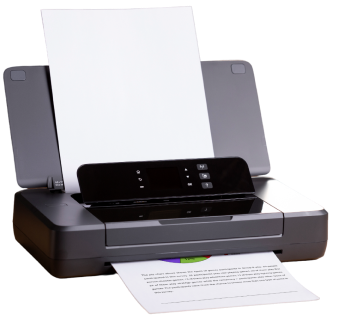Before renting, leasing, or buying copiers, commercial office printers, or other office machines, it’s important to know exactly what office equipment your office needs. We recommend that businesses determine whether they need to buy, rent, or lease a copier or other office equipment, and choose the best option for their needs.
No two workplaces run in identical workflows. Thus, you must always consider your position before making any final decision.
Common factors that could potentially influence your decision include the size and volume of your average print job, your operating budget, and the types of print jobs your organization needs.
It can be challenging to learn the difference between a copier lease and a rental. Both terms share the same meaning in the dictionary. However, despite the confusing terminology, it’s necessary to remember that renting copiers is a different experience from leasing copiers.
This blog has detailed the factors that set these options apart, the essential factors to consider, and their cost-effectiveness. By the end, you will have a firm grasp of copier lease, rental, or buying to pick the solution that best fits your company’s needs.
Understanding Copier Leasing
Copier leasing is a way for large and small businesses to use a copier or printer without buying it upfront. Instead of paying the full price at once, you make small monthly payments over the agreed period. It usually takes 1 to 5 years.
Leasing is helpful. It allows you to use a good-quality copier without spending a lot of money all at once. Many copier leases also include service and maintenance, so if something breaks or you need toner, it’s usually covered.
At the end of the leasing tenure, you can either choose to return the copier, you can buy it for a lower price, or upgrade to the latest model. Copier leasing is a smart option for businesses that want to save money, stay up to date with advance technology, and avoid the hassle of owning old machines.
Understanding Copier Rental
Copier rentals are like car rentals. In simple terms, you will pay a fee for the usage for a short tenure. Much like car rentals, they are also meant for short-term use. Rental periods could range from a single day to an entire month.
The payment could be paid per month, week, or on a daily basis. Predictably, your organization will not have complete ownership of the device at the end of your short-term rental agreement.
For occasional use, organizations often need to rent copiers when they are far away from their base location. This is the finest way to use advanced copier technology without investing in a long-term or expensive commitment.
A copier rental could suit your organization if it engages in seasonal business or experiences a sudden, dramatic boost.
Understanding Copier Buying
Owning an advanced copier can benefit your business if it involves document printing and management. It can directly influence your business’s efficiency and bottom line. The best possible way to secure the equipment is to purchase it.
However, before making that investment, you must know what a copier purchase means. Investing in a copier means your organization pays the total typical price to acquire the copier machine. This approach gives you absolute control over the device’s functionality, maintenance, and upgradation.
Unlike leasing or renting, you don’t have to pay monthly usage fees or commit to contract terms or conditions. However, you must learn the potential of a copier purchase to make educated business decisions.
Although it may not offer the ease of renting or the flexibility of leasing, buying a copier can be a cost-effective solution for businesses. They tend to be strategic and bring long-term stability and control.
Key Differences between Copier Leasing, Renting, and Buying
When it comes to investing in a copier for business, you have three main options. Leasing, renting, or buying a copier. Each approach promises its benefits, limitations, and financial importance.
Understanding the fundamental differences between them can benefit your business’s operational and budgetary needs.
- Copier leasing suits organizations that need long-term use with predictable monthly payments and access to the newer models. Copier leasing agreements are typically 1–5 years and may include maintenance and service.
- Copier renting provides temporary flexibility. It is suitable for short-term projects, off-site locations, or seasonal needs. It’s more expensive for daily, weekly, or monthly use. But commitment or ownership is not required.
- Buying a copier means complete ownership after an initial investment. It ensures the lowest total expense and full control over time. However, you have to assume the responsibility of maintaining and upgrading the device.
Your decision about buying, leasing, or renting a copier will depend on the duration of your need, your budget, and the kind of control over the equipment.
Copier Leasing or Renting Vs. Buying – Key Components to Consider
It’s important to note that investing in a copier involves more than just the upfront cost. Deciding whether to rent, lease, or buy should align with your business’s short-term goals, long-term goals, daily operations, and workflow needs.
We have outlined the key factors we should consider before making a decision.
1. Duration of Use
We recommend starting by considering how long we need the copier. If we need the device for a short-term project, renting a copier is the most cost-effective and practical solution.
Short-term copier rentals can last from a few days to a few months, providing you with access without a long-term commitment. But any organization needs a copier for regular use; leasing or buying is a better option.
Leasing is a convenient option for businesses with steady performance and predictable monthly fees. It doesn’t require full ownership.
On the other hand, buying a copier is ideal for organizations looking to avoid higher long-term costs. It’s cost-effective if we plan to use the copier for long time. Thus, we must align the copier arrangement with our timeline.
2. Budget and Cash Flow
Your budget and broader financial purse will also influence your decision. To put it simply, if you have a humble budget, leasing or renting can ease your future expenses and cash flow pressure. This can be particularly beneficial for emerging startups and businesses navigating shoestring budgets.
But if you have the big bucks in your pocket, buying a copier outright guarantees minimal expense in the long run. If you can eliminate recurring payments, you will show more economic pragmatism over several years.
Ultimately, you must evaluate your financial strategy to determine whether you should make lower monthly payments or a one-time investment.
3. Maintenance and Support
Upkeep and support can also impact your copier experience. With most rental and lease contracts, toner, upkeep, and repairs are included in the contract. This safeguards your business during any accident with moderate disruption.
When you buy a copier, you have to maintain it. You could always consider paying out of pocket for the upkeep or repairs, but it will eventually add up to be a costly affair.
Thus, you must assess the viable support options to reduce downtime and keep your business operations running smoothly.
4. Scalability and Upgrades
Flexibility becomes key if your business experiences growth or you predict variation in copier demand. Long-term copier leases often become the go-to option for improving your existing setup during or at the end of the lease term. It can benefit you in keeping up with the current technology.
If you have to deal with occasional spikes in demand, opt for copier renting. This arrangement enables businesses to have temporary scaling opportunities without long-term obligations. Alternatively, buying hinders any prospect of flexibility.
Swapping out ancient devices requires buying a new copier. You must focus on scalability, especially in fluctuating business setups where requirements can change quickly.
5. Usage Volume and Features
There are many types of copier machines, each offering different features and functions. For businesses with high printing or copying needs, it’s wise to lease or buy a copier with advanced features, including color printing, fast output, finishing tools, and network connectivity.
However, if your usage is low or occasional, renting a basic model may be enough.
When selecting a copier, consider your average print volume, whether you need color or just black and white, and any special features you may require. Matching the copier’s capabilities to your actual needs can help you save money and avoid paying for features you won’t use.
6. Contract Terms and Flexibility
It’s important to read and understand every contract carefully. Lease contracts seek your commitment for several years. They may charge a fee if you end the contract early. However, businesses in flux might struggle with them, as they don’t provide flexibility.
Copier Rental agreements ensure greater flexibility, enabling businesses to quit or adjust terms as per change. But when you purchase a copier, you do away with agreements for good. The organization assumes total ownership of the equipment and has complete control.
Before signing any agreement, you must clearly understand the upgrade paths, cancellation terms, and renewal clauses.
7. Ownership and Long-Term Value
Determine the ultimate and overall value of your copier. When opting for rentals, you will pay only for usage without building any equity. Leasing often involves buying out the device at the end of the term. It offers a balance between ownership and flexibility.
Buying a copier will get you complete ownership from day one. While this proves to be a cost-effective option in the long run, it may also promise potential resale value and tax depreciation.
Check if device ownership benefits your business strategy or service and if flexibility is more valuable.
| Feature | Copier Rental | Copier Lease | Copier Purchase |
| 1. Duration of Use | Short-term projects (days to months) | Regular use, predictable monthly expenses | Long-term regular use, extended lifespan desired |
| 2. Budget & Cash Flow | Lower upfront cost, eases cash flow pressure | Predictable monthly payments, lower initial cost | Higher upfront investment, minimal long-term cost |
| 3. Maintenance & Support | Often included in the contract (toner, repairs) | Usually included in the contract (toner, repairs) | Responsibility of the owner, potential for high costs |
| 4. Scalability & Upgrades | High flexibility for temporary scaling | Often allows upgrades at the end of the lease period | Limited flexibility, new capital needed for upgrades |
| 5. Usage Volume & Features | Suitable for low-volume, occasional use | Access to the latest features for high-volume needs | Tailor features to needs, but fixed after purchase |
| 6. Contract Terms & Flexibility | Highly flexible, easy to adjust/quit terms | Commitment for several years, potential penalties | No contract, complete control |
| 7. Ownership & Long-Term Value | No equity, pay for usage only | Option to buy out at end, balance of ownership & flexibility | Complete ownership from start, potential resale & tax benefits |
Copier Leasing, Copier Rental, And Copier Buying: Which Option Is Best For Your Business?
Investing in the perfect copier can remarkably influence your workflow and operational flexibility. You will also notice the positive effects on your organization’s bottom line.
You have only three main options available: leasing, renting, and purchasing. All three promise distinct benefits and drawbacks.
We have provided them with details so that you can pick the best option for your business.
Copier Rental
If your organization requires a copier for an immediate project, renting is likely your best option. The arrangement benefits short-term setups.
You can aim for optimum convenience, with upkeep and support usually included in the rental charge. Copier rental relieves you of any long-term commitment or depreciation. Moreover, you can consider returning the device when it’s no longer needed.
But this element of convenience is a trade-off. Monthly rental payments are steeper than lease payments and don’t make financial sense for long-term use. Also, rental units offer fewer customization options than purchased or even leased equipment.
Copier Leasing
Leasing a commercial photocopier often seems like an educated strategic move for organizations that want modern equipment without breaking the bank. This arrangement enables businesses to access premium devices with newer technology.
Copier leasing provides predictability. The locked monthly payment simplifies budgeting. You also have the option to improve your device setup when your lease ends or even mid-contract. In simple terms, your organization will always employ the latest technology.
However, copier leasing is not devoid of contractual obligations. The contract demands your total commitment, which may feature penalties for premature termination. Furthermore, you don’t own the device unless you consider buying it out at the end of the lease term.
Copier Buying
Buying a copier outright is the most direct option since it makes the most justifiable sense over time. When you pay for the purchase, you immediately assume complete ownership of the machine. Also, you don’t need to engage in monthly payments, contract terms, or end-of-term decisions.
This arrangement also provides monetary advantages, including potential tax deductions through depreciation. It further fuels the decision to buy a copier for stable businesses. It complements their approach of investing in equipment for long-term use without requiring routine upgrades.
Speaking about the downside, purchasing a copier warrants a significant higher upfront cost.
Humble organizations with limited capital will struggle to achieve it. Upkeep and repair duties will also lie on your side unless you get a separate service agreement.
In short, there is no universal answer to this question. The perfect solution must meet your operational demands, budget flexibility, and duration of use.
Copier Leasing vs. Buying: What’s Better in the Long Run?
Most businesses struggle with whether to choose a copier lease or a rental. Both prospects present a respective set of advantages and limitations. The better choice will ultimately depend on your business’s operational needs, financial situation, and long-term goals.
Leasing a Copier
There are always many takers for copier leasing in modern times. Most businesses show an inclination towards a fixed monthly payment structure, which allows them to ignore the large upfront expense of buying.
Organizations can amortize copier expenses over a contract term, often between 12 and 60 months. This can also offer access to advanced copier technology without having to dump money every few years.
Moreover, lease contracts often provide the option of bundling service and maintenance into one. Thus, you can get toner replacement, repairs, and troubleshooting. This can decrease downtime and keep your team productive.
But leasing means you commit to payments for the entire contract. Also, you don’t own the device unless you purchase it at the end of the lease term.
Buying a Copier
Purchasing a copier means you have to make a significant upfront investment. Yet, it has the potential to be more cost-effective in the future. A copier purchase will ensure you total ownership of the device outright. Also, you will be free from paying any ongoing lease payments and have complete control over its upgrades, usage, and maintenance.
This tends to be an educated option for organizations with stable print needs and enough finances to cover the initial expense. Purchasing also takes out contractual obligations, thereby guaranteeing you more flexibility. But all repair and upkeep duties remain with you unless you buy a separate service plan.
Purchasing could guarantee the greatest return on investment if you have an established organization and ambitions to employ the same copiers over an extended period.
Common Mistakes to Avoid When Choosing a Copier Solution
Picking whether to purchase, lease, or rent a copier can be a significant decision. Most organizations repeat this error, costing them expensive resources and productivity. Having a detailed idea about the different arrangements can keep you from making any short-sighted or costly decision.
1. Failing to Assess Actual Usage Needs
Many businesses struggle to measure their printing and copying needs. Thus, opting for an entry-level device can cause unending downtime and frustration. But trying out pricey copiers for occasional projects also leads to wasted resources. We recommend running a usage audit to make the right decision.
2. Ignoring Total Cost of Ownership (TCO)
It’s simple to concentrate only on the upfront price. However, the combined expense of ownership includes consumables, maintenance, repairs, and potential upgrades. You may find leasing an appealing option right at the beginning. Yet, if your agreement has restrictive usage limits or hidden service fees, the long-term expenses could stack up significantly.
3. Overlooking Contract Fine Print
Ignoring the fine print or paying little attention to it can also be a grave error. You must go over every detail with the utmost attention. The terminology may feature automatic renewals, premature termination fees, service inclusions, and overage charges. If you choose to change tactics, your organization could be locked into rigid contracts with high penalties.
4. Choosing Based Solely on Price
Although sticking to the budget is crucial, cheap skating is also detrimental. Entry-level copiers don’t often promise vital features or come with hefty upkeep costs. We recommend investing in a device that satisfies your performance needs and growth trajectory. You should pay the necessary high additional costs to ensure this.
5. Not Considering Future Scalability
Something serving your organization today with great results might struggle to do the bare minimum tomorrow. You must ensure your copier arrangement can keep up with the changing times if you anticipate occasional fluctuations, growth, or changes in workflow.
6. Skipping Professional Guidance
Most entities settle for a copy machine without seeking an expert opinion. A reliable expert can help you get better terms, evaluate your real needs, and guarantee compatibility with your existing infrastructure.
You must avoid committing such mistakes when picking a copier lease or rental.
Need More Help? Get a Consultation from Network Digital
Pondering the decision to lease or rent a copier can be overwhelming and challenging. But partnering with a managed print service (MPS) provider, like Network Digital, simplifies the process.
Their clients regularly save money by investing in gear upgrades, making strategic decisions about leasing versus buying, and removing underutilized machines. Their services can assist you further beyond the initial guidance.
When you pick Network Digital for print management, their team of industry experts will collaborate with your organization to build your entire printer fleet. Plus, they will ensure your processes get more precise and avoid common mistakes.

